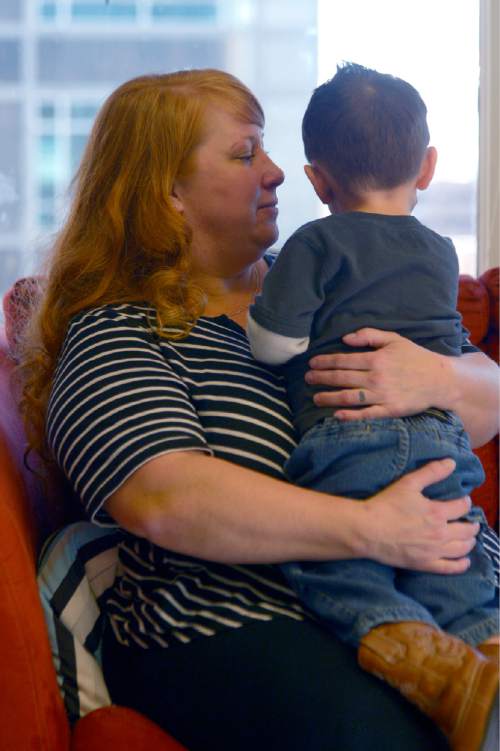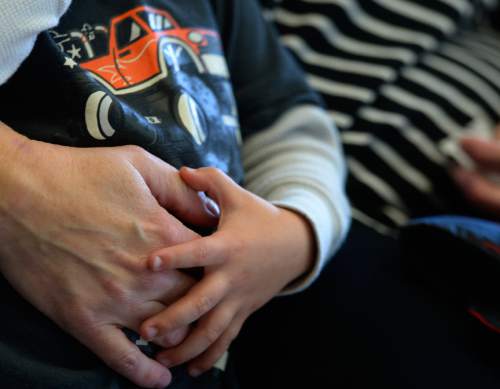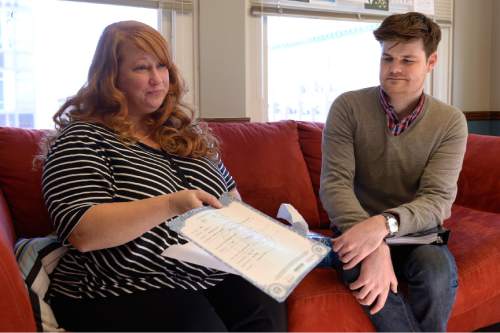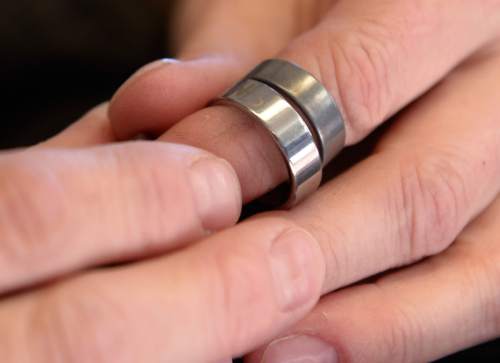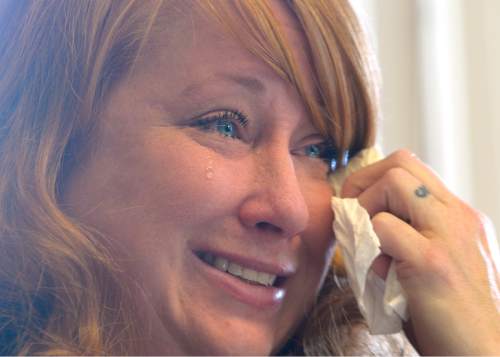This is an archived article that was published on sltrib.com in 2015, and information in the article may be outdated. It is provided only for personal research purposes and may not be reprinted.
The best gift Nicki Bidlack got for Christmas in 2015 was a piece of paper.
It's an amended birth certificate for her 2-year-old son that lists both Bidlack and the late Sara Clow as the boy's mothers.
"This is what she would have wanted," said Bidlack, 41, of Ogden, her voice trembling as tears slid across her cheeks. "She wanted him from before he was born. To have her name on it … to have him see her name, even though she's not here … she would be so happy."
Clow, 29, died from injuries sustained when she rolled her pickup on Interstate 15 near Willard just before midnight on Sept. 13, 2014.
The birth certificate was issued as part of a Dec. 4 order from 2nd District Judge Ernest Jones that recognized the couple's eight-year relationship as a common-law marriage — a decision believed to be the first for any gay couple in Utah, attorney Christopher Wharton said.
The ruling will allow Bidlack to access critical benefits for the son she's now raising alone, Wharton added.
Because Bidlack and Clow had not married — and legally could not in Utah until two years ago — when Clow died, her estate and death benefits were out of reach, even for the couple's son, who is biologically Clow's.
"I feel like he's been denied things that any other child would have had," said Bidlack.
So she sought help from Wharton, a family law attorney, who has been a longtime advocate for gay rights.
"I was convinced that there was enough legal precedent out there that this was a 14th Amendment right being denied," he said.
Wharton had both timing and the law on his side.
Utah is one of eight states that recognizes common-law marriage, unions between two people who have not obtained a marriage license or solemnized their relationship through some other ceremony.
When written, the common-law statute was like all other Utah laws related to marriage: it applied specifically to relationships between men and women.
But in the wake of the 2013 federal court ruling that found Utah's law barring gay marriage unconstitutional, Wharton believed the finding would apply equally in the case of a common-law union.
"If the state is going to expand on who qualifies for marriage, then they have to open that door here as well," he said.
Couple that with a Utah Supreme Court decision from 2014 that said common-law status could be conferred posthumously if the claim was raised within one year, and Wharton believed he had grounds for a strong case.
He filed a petition seeking recognition for the common-law marriage in February.
Wharton had to prove three elements: mutual dependency (emotionally and financially), cohabitation, and that the couple had held themselves out to others as married.
Bidlack's story, the details added by witnesses and dozens of photos presented to the court, painted a picture of their love and commitment.
The couple met in late 2006, when both were involved in a Thursday night bowling league in Ogden. The connection was instant, Bidlack said.
"Whenever I looked into her eyes, there was this completion," she said. "I had been married before, but never in my life have I ever felt what I felt for Sara."
Within a year, they were building a life, sharing a home in Ogden and co-parenting Bidlack's young children from a previous marriage.
The couple often discussed marriage, but at the time, same-sex unions were illegal in Utah. Bidlack said they opposed getting married elsewhere only to bring home a license that would be invalid here.
Instead, in 2009, the couple held a commitment ceremony in front of the fountains at the Bellagio Hotel and Casino in Las Vegas, which was one of Clow's favorite spots. They exchanged shiny, black tungsten wedding bands that were engraved with the entwined initials N and S — the same image already tattooed on their ring fingers.
"We promised each other that we would be there for each other no matter what," Bidlack said.
Then in June 2013 came a baby boy — a dream come true for Clow, who had given up college to raise her two younger brothers and had always wanted a child of her own, Bidlack said.
"When we first got together, I told [Clow] I wasn't going to have any more kids. I was happy with my two," said Bidlack. "But she had always wanted a biological child, so as things got going and our relationship was what it was, I didn't hesitate when we started talking about it."
Bidlack carried the baby, which was produced with an egg provided by Clow and donor sperm.
"We wanted [the baby] to be, in the best way we could, from both of us," Bidlack said. "So biologically, it would be hers, but I was the one that was to carry."
At the time of the boy's birth, Bidlack said the couple asked to add Clow's name to the birth certificate, but were denied.
"Legally, she had no rights to him, even though she was his biological mother," Bidlack said.
The boy, whose name is not being published at Bidlack's request, is the spitting image of Clow, she said, from his dark hair and sparkling eyes to his apple cheeks and his serious nature and quirky mannerisms.
At night before bed, Bidlack said, her son carefully "parks" his toy trucks in a row, with the same sort of neat precision that Clow used to hang her clothes in color-coordinated groups and line up her shoes.
"Oh yes," Bidlack says with a smile. "He's like her."
Clow's death devastated the family both emotionally and financially, Bidlack said. But fighting for legal recognition of her relationship is about far more than money, she said. It's about giving her son the surety that he was wanted and loved by the mother who can't be here, she said.
The ruling, which the judge issued from the bench, is an important one for Utah's lesbian, gay, bisexual and transgender community, Salt Lake City gay-rights attorney Paul Burke said.
"It's another step in treating LGBT Utahns like all other citizens," he said. "That's fundamentally why it's important."
Wharton, who has two similar cases underway, hopes that others will hear Bidlack's story and come forward to seek legal help for their own families.
"We have this special right in Utah, and same-sex couples can benefit from this," he said.
Bidlack believes Clow, always the family caretaker, would be pleased to know others may be able to benefit from her family's experience.
But mostly, she is just glad to have that blue and pink piece of paper.
"I have her still," she said, her voice lowering to a teary whisper. "I have her through him. … I wanted him to have this, both parents on the birth certificate, so he will know."


